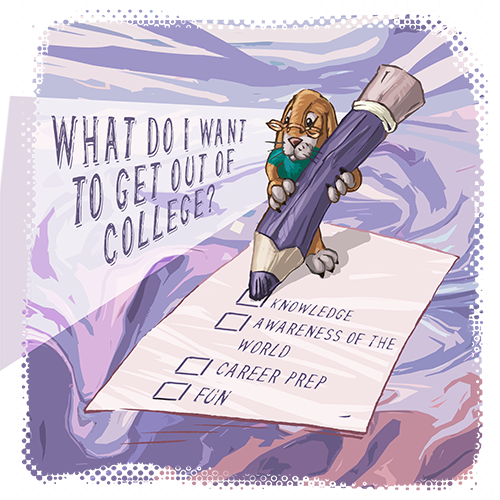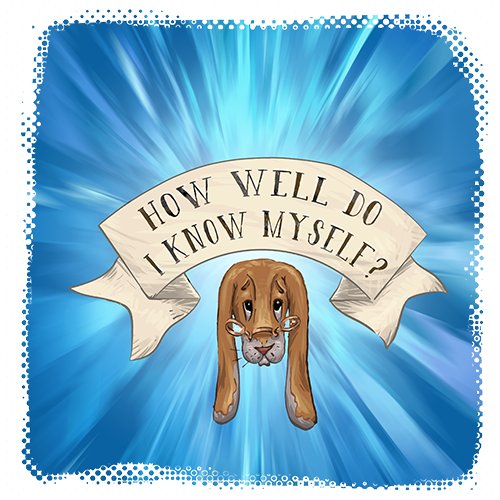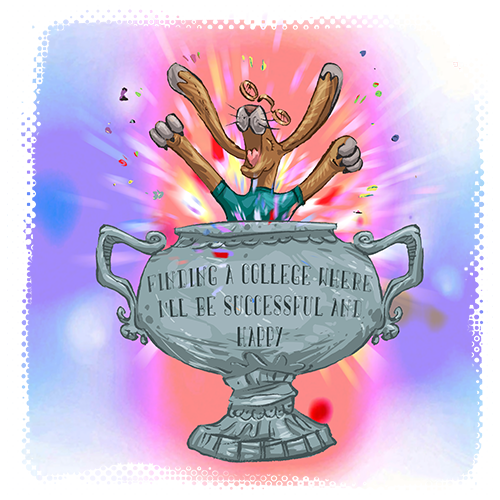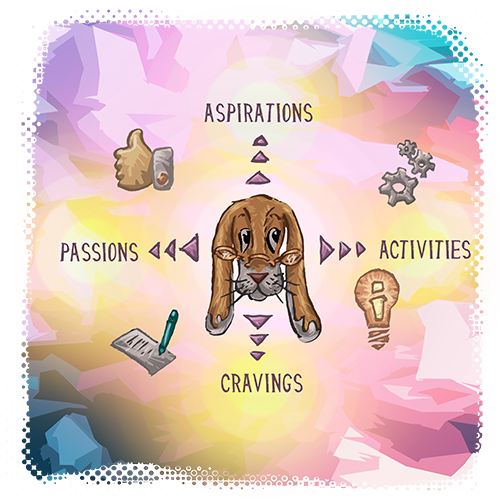PVHSCCC College & Career Library
Below you will find a number of great books that offer helpful information on College and Career Planning for parents and students! (Descriptions via Google Books)
The College Finder: Choose the School That’s Right for You! 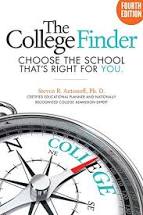
Fourth Edition
By Steven R. Antonoff, Ph.D.
In the fourth edition of The College Finder, Dr. Steven R. Antonoff has compiled nearly 700 lists that will help students zero in on the colleges where they can get in and fit in. As the author notes, “The primary goal of The College Finder is to expand the pool of schools that students consider, extend the possibilities they envision, and magnify their sense of power as they research colleges.” College guides tend to be thick compendiums offering “snapshots” of hundreds of schools. Much of this information is available on individual college websites, and little of it will help a student differentiate among the thousands of choices out there.
The College Finder is in a class by itself. Essentially, it is a book of lists. The latest edition features lists of schools organized by essential categories (Academics, Student Life, Athletics, Costs, Admission, and Expert Opinions) as well as unexpected classifications (Where Most Students Live On Campus, Great Colleges For Cyclists, Colleges With the Most Computers Available to Students, Great Value Colleges, and Hidden Gems). Want to find out which schools charge no tuition, combine undergraduate degrees with a medical degree, offer toy design, are committed to the environment, love their football teams, seek diversity in their student body, or have unusually accessible teachers
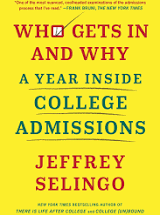
Who Gets In and Why: A Year Inside College Admissions
By Jeffrey Selingo
From award-winning higher education journalist and New York Times bestselling author Jeffrey Selingo comes a revealing look from inside the admissions office—one that identifies surprising strategies that will aid in the college search.
In Who Gets In and Why, journalist and higher education expert Jeffrey Selingo dispels entrenched notions of how to compete and win at the admissions game, and reveals that teenagers and parents have much to gain by broadening their notion of what qualifies as a “good college.” Hint: it’s not all about the sticker on the car window. Selingo, who was embedded in three different admissions offices—a selective private university, a leading liberal arts college, and a flagship public campus—closely observed gatekeepers as they made their often agonizing and sometimes life-changing decisions. He also followed select students and their parents, and he traveled around the country meeting with high school counselors, marketers, behind-the-scenes consultants, and college rankers.
While many have long believed that admissions is merit-based, rewarding the best students, Who Gets In and Why presents a more complicated truth, showing that “who gets in” is frequently more about the college’s agenda than the applicant. In a world where thousands of equally qualified students vie for a fixed number of spots at elite institutions, admissions officers often make split-second decisions based on a variety of factors—like diversity, money, and, ultimately, whether a student will enroll if accepted. One of the most insightful books ever about “getting in” and what higher education has become, Who Gets In and Why not only provides an usually intimate look at how admissions decisions get made, but guides prospective students on how to honestly assess their strengths and match with the schools that will best serve their interests.
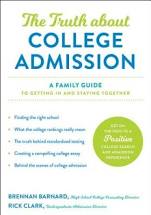
The Truth about College Admission: A Family Guide to Getting In and Staying Together
By Brennan Barnard, Rick Clark
Is your family just starting to think about visiting colleges? Maybe you are in the throes of the experience, feeling stressed out and overwhelmed. Did we miss a deadline? Should we be looking in-state or out-of-state, big school or small school? And what is a "FAFSA" anyway?
The Truth about College Admission is the easy-to-follow, comprehensive, go-to guide for families. The expert author’s “with inside knowledge from both the high school and university sides of the experience” provide critical advice, thoughtful strategies, helpful direction, and invaluable reassurance during the long and often bewildering college admission journey. From searching for colleges and creating a list of favorites to crafting an application, learning what schools are looking for academically and outside the classroom, and getting insight into how colleges decide who to accept, this book covers every important step. Helpful sections like "Try This," "Talk about This," and "Check In" show your family how to have open and balanced conversations to keep everyone on the same page, feeling less stressed, and actually enjoying the adventure together. The Truth about College Admission is the practical and inspiring guidebook your family needs, an essential companion along the path to college acceptance.
 College Admission Essentials: A Step-by-Step Guide to Showing Colleges Who You Are and What Matters to You
College Admission Essentials: A Step-by-Step Guide to Showing Colleges Who You Are and What Matters to You
By Ethan Sawyer
You may think that getting an acceptance letter from selective colleges and universities is a mad dash to the top that only the very best students survive, and those who make it are just the lucky ones. Stress levels soar as it feels like the bar is rising higher and everything is out of your control. But that's not true! You can take control, and you can do it in a way that's as effective as it is empowering. From describing your extracurriculars to interviews with admission officers, it comes down to two questions:
What matters most to you? How does it manifest in your life?
The answers will give direction to every part of the admission process. Ethan Sawyer (the College Essay Guy), along with dozens of top admission experts, will help you stand out by showing colleges and universities how your values and your drive will change you, your alma mater, and the world.
Inside you'll find...Advice and insight from a team of counselors, advisors, and deans of admission, Interactive exercises that quickly and easily provide the best content for your application, Access to a massive database of online resources, including organizational tools and in-depth guides, Guidance for veterans, students with learning differences, LGBTQ+ students, students interested in women's colleges or HBCUs, and more!
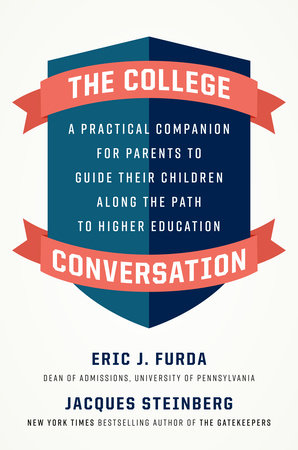 The College Conversation: A PRACTICAL COMPANION FOR PARENTS TO GUIDE THEIR CHILDREN ALONG THE PATH TO HIGHER EDUCATION By ERIC J. FURDA and JACQUES STEINBERG The College Conversation is a comprehensive resource for mapping the path through the college application process that provides practical advice and reassurance to keep both anxious parents and confused children sane and grounded. Rather than adding to the existing canon of “How to Get In” college guides or rankings, Eric Furda and Jacques Steinberg provide a step-by-step approach to having the tough conversations on this topic with less stress and more success. The book is organized around key discussions and themes that trace the chronological arc of admissions and financial aid–beginning before the assembly of a list of potential colleges and continuing through the receipt of decisions–with a final section that includes advice on the first year of college. The topics include preliminary conversations about the search, and specifically how parents can think about their children’s interests and what kind of college would best suit them; choosing a college (based on its curriculum, culture, and community); writing the most effective essays; assessing acceptances, including considerations of finances and aid; and making the transition from high school to college life.
The College Conversation: A PRACTICAL COMPANION FOR PARENTS TO GUIDE THEIR CHILDREN ALONG THE PATH TO HIGHER EDUCATION By ERIC J. FURDA and JACQUES STEINBERG The College Conversation is a comprehensive resource for mapping the path through the college application process that provides practical advice and reassurance to keep both anxious parents and confused children sane and grounded. Rather than adding to the existing canon of “How to Get In” college guides or rankings, Eric Furda and Jacques Steinberg provide a step-by-step approach to having the tough conversations on this topic with less stress and more success. The book is organized around key discussions and themes that trace the chronological arc of admissions and financial aid–beginning before the assembly of a list of potential colleges and continuing through the receipt of decisions–with a final section that includes advice on the first year of college. The topics include preliminary conversations about the search, and specifically how parents can think about their children’s interests and what kind of college would best suit them; choosing a college (based on its curriculum, culture, and community); writing the most effective essays; assessing acceptances, including considerations of finances and aid; and making the transition from high school to college life.
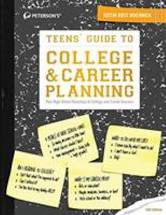 Teen's Guide to College & Career Planning
Teen's Guide to College & Career Planning
By Justin Ross Muchnick
With input from teens, parents, and numerous experts, Teens' Guide to College & Career Planning knows just how to talk to high school students about the important decisions involving life after graduation. This easy-to-read guide, with updated content, enables busy students to hone in on the right information for them. Whether it's mapping the road from high school to college, figuring out financial aid, determining if joining the military is the right move, preparing for an interview, or developing early career skills, Teens' Guide addresses each option available to young adults with meaningful information. Inside you'll find valuable advice from guidance counselors, instructors, college admission officials, military officers, and most importantly-other high school students!

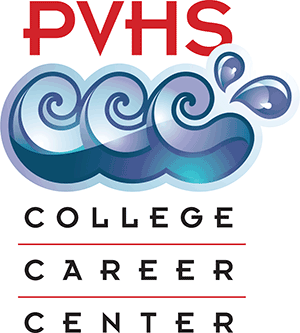 Room: 318
Room: 318
 College
College The College Conversation:
The College Conversation: 

